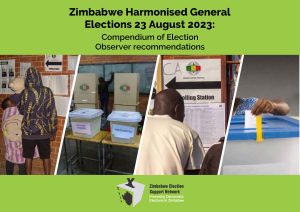The General Laws Amendment Act (GLAA) was gazetted and became part of the laws of the land on 1 July 2016. The GLAA took an omnibus approach to amend and attempt to align 126 Acts with the Constitution. Prior to GLAA’s enactment and passage in parliament, the Zimbabwe Election Support Network (ZESN) had made submissions specific to the portions relating to the amendment of the Electoral Act. The analysis focusses on the extent to which the latest amendments address the concerns around the electoral law…read more
An Analysis of the General Laws Amendment Act (2016) by ZESN
Critical Steps in implementation of BVR
Implementation of Biometric Voter Registration (BVR) system requires careful planning, preparation and implementation to ensure that is it successfully implemented. Failure to follow due process in the implementation could jeopardise the process, with devastating consequences for electoral integrity and credibility… read more
Biometric Voter Registration: Lessons from Ugandan polls
On February 18, I went to Uganda to observe the presidential and parliamentary elections there. This was the first election to be held using the biometric voter registration (BVR) system in Uganda. The first lesson I learnt was that BVR and the use of ICTs is not a silver bullet to all electoral challenges. While the BVR machines worked well, they were a number of shortcomings, in particular the electoral environment… read more
ZESN All Stakeholders Conference Presentations
Towards-democratic-elections-priority-areas-for-reforms
International-perspectives-on-electoral-reform
The-political-environment-presentation
Enhancing Transparency in Elections
Role of the media in elections
Investigation in Electoral Related Conflict
Operationalization of BVR – ZEC Paper
Dispute resolution lessons from the region
Constitutionalism and Legal framework of election in Zimbabwe Identifying key gaps
ZESN’s PAPER ON THE REGULATIONS FOR THE VOTER REGISTRATION PROCESS
ZESN as part of its mandate to promote democratic electoral processes in Zimbabwe is calling for consideration of the following key issues in the crafting of the electoral regulations pertaining to voter registration as Zimbabwe is scheduled to implement a biometric voter registration exercise in 2017…Read more
DELIMITATION OF BOUNDARIES IN ZIMBABWE IN 2018
The country faces the risk of going into a second election without a delimitation of electoral boundaries. It is good practice to periodically and regularly review electoral boundaries. It is argued that failure to perform a delimitation exercise before the 2018 elections is likely to affect the credibility and legitimacy of the electoral outcome…more
DELIMITATION OF BOUNDARIES IN ZIMBABWE IN 2022
It is highly unlikely that the delimitation process will be completed in time for the report and maps to be adopted for use in the 2018 elections, as the delimitation process must be completed six months before any election. Another challenge will be availability of the new maps and boundaries to all stakeholders including civil society organisations in time for adequate voter education…more
2018 or 2023 Summary of opinions on delimitation in Zimbabwe
The last delimitation exercise in Zimbabwe was carried out in 2008, shortly before the harmonised elections held on 29 March. By the time the 2018 elections are held, Zimbabwe would have gone 10 years without any delimitation of electoral boundaries. The Zimbabwe Electoral Commission (ZEC) is currently carrying out a Mapping Boundary Verification exercise which commenced on the 18th January 2017 and is expected to end on 4th April 2017…more
Mass Biometric Voter registration – Lessons from Kenya
Recently, ZESN observed the Mass Voter Registration process in Kenya, where Kenyans were registering using the Biometric Voter Registration (BVR) system which Zimbabwe is about to adopt for the 2018 Elections. The learning missions to Kenya was an eye opener especially given that Kenya was doing the BVR exercise for the second time before a major election having done BVR prior to their 2013 elections…more
Lesson from Kenya on Electoral Reforms_ Article 2
Political will is often times the missing ingredient to successful electoral reform. This has been the case with Zimbabwe and many other African countries. However an analysis of the recent changes to Kenya’s Electoral Act reveals a peculiar phenomenon. Political will to amend the Electoral Act was evident…more
